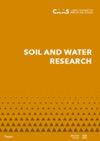Changes in grassland area in lowlands and marginal uplands: Medium-term differences and potential for carbon farming
IF 1.7
4区 农林科学
Q4 SOIL SCIENCE
引用次数: 0
Abstract
Grassland as a part of farmland is important for agrobiodiversity, soil protection and agricultural production (grazing, hay production). In the Czech Republic, grassland area increases with increasing altitude. In this study we evaluated the period 1966–2021 and the change in grassland area in different locations in South Bohemia region: fertile lowlands (PĂsek, ÄeskĂŠ BudÄjovice, TĂĄbor districts) and marginal uplands (ÄeskĂ˝ Krumlov, Prachatice districts). Data on land use including the share of grassland were obtained from the Czech Cadastral and Surveying Office and Czech Statistical Office. In the upland districts, there is the largest share of grassland areas in the whole region. The prevalence of grasslands is probably due to the geographic and climatic conditions, which are challenging here. Our research shows the results of changes in grassland areas between 1967 and 2021, with regard to the assessed districts. The difference in the percent area of grassland in 2021 compared to 1967 is –0.04 to –1.77 for lowlands, and +1.45 to +5.99 for uplands. Despite this, uplands farmers practice relatively extensive farming methods and extensive grazing due to low ruminant numbers. Although farmers maintain relevant carbon sinks, it is unlikely to increase the carbon stocks per hectare of extensive grasslands on an annual basis, which would be a barrier to participation in a carbon farming system.低地与边缘高地草地面积变化:中期差异与碳农业潜力
草地as aÂ部分ofÂ农田isÂ对农业生物多样性、土壤保护和农业生产(放牧、干草生产)具有重要意义。InÂ在捷克共和国,草原面积随着海拔的增加而增加。在这项研究中我们评估了1966 - 2021年期间和变化在草原地区在不同的位置在南波西米亚地区:肥沃的低地(PĂ克朗,一个面ĂŠ布达jovice, TĂĄbor区)和边际高地(一个面Ă˝Krumlov, Prachatice区)。数据onÂ土地利用(包括份额ofÂ)来自捷克地籍和测量局和捷克统计局。InÂ以高地地区,有isÂ所占份额最大ofÂ草原面积inÂ全区。流行ofÂ草原isÂ可能是由于toÂ地理和气候条件,这是具有挑战性的。我们的研究结果显示ofÂ变化inÂ草地面积1967年和2021年之间,对于toÂ评估区。差异inÂ面积百分比ofÂ草地in 2021与to 1967相比is -0.04 toÂ低地为-1.77,高地为+1.45至+5.99。尽管如此,由于toÂ反刍动物数量少,高地农民采用相对粗放的耕作方法和广泛的放牧。虽然农民保持相关的碳汇,itÂ不太可能toÂ每公顷增加碳储量ofÂ广阔的草原onÂ每年的基础上,这将be aÂ阻碍toÂ参与in aÂ碳农业系统。
本文章由计算机程序翻译,如有差异,请以英文原文为准。
求助全文
约1分钟内获得全文
求助全文
来源期刊

Soil and Water Research
Water resources, Soil Science, Agriculture-WATER RESOURCES
CiteScore
4.60
自引率
0.00%
发文量
26
审稿时长
>12 weeks
期刊介绍:
An international peer-reviewed journal published under the auspices of the Czech Academy of Agricultural Sciences and financed by the Ministry of Agriculture of the Czech Republic. Published since 2006.
Thematic: original papers, short communications and critical reviews from all fields of science and engineering related to soil and water and their interactions in natural and man-modified landscapes, with a particular focus on agricultural land use. The fields encompassed include, but are not limited to, the basic and applied soil science, soil hydrology, irrigation and drainage of lands, hydrology, management and revitalisation of small water streams and small water reservoirs, including fishponds, soil erosion research and control, drought and flood control, wetland restoration and protection, surface and ground water protection in therms of their quantity and quality.
 求助内容:
求助内容: 应助结果提醒方式:
应助结果提醒方式:


